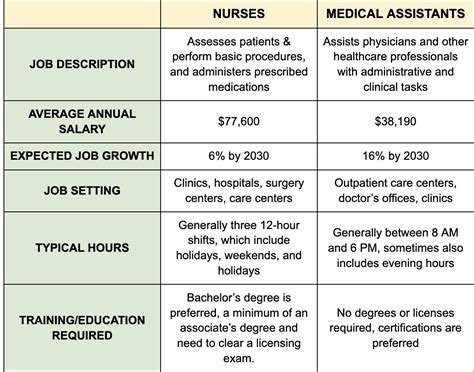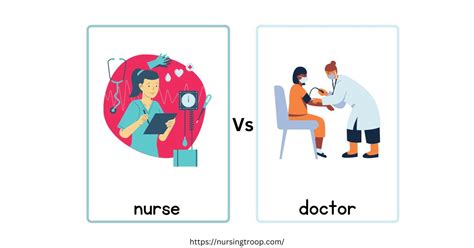Nurse vs Doctor: Key Differences

Introduction to Nursing and Doctoring Professions

The healthcare industry is comprised of various professions, each playing a vital role in ensuring the well-being of patients. Two of the most prominent professions in this field are nursing and doctoring. While both nurses and doctors are essential to the healthcare system, there are significant differences between the two professions. In this article, we will delve into the key differences between nurses and doctors, exploring their roles, responsibilities, educational requirements, and career paths.
Roles and Responsibilities

Nurses and doctors have distinct roles and responsibilities in the healthcare system. Nurses are responsible for providing hands-on care to patients, administering medications, monitoring patient conditions, and maintaining accurate records. They work closely with doctors to develop and implement patient care plans. Nurses can specialize in various areas, such as pediatrics, gerontology, or oncology. On the other hand, doctors are responsible for diagnosing and treating patients, prescribing medications, and performing surgeries. They are also involved in preventive care, health education, and research.
Education and Training

The educational requirements for nurses and doctors differ significantly. To become a nurse, one must earn an Associate’s or Bachelor’s degree in nursing, followed by passing the National Council Licensure Examination (NCLEX) to obtain a nursing license. Nurses can further their education by pursuing a Master’s or Doctoral degree in nursing. In contrast, doctors must earn a Bachelor’s degree, followed by four years of medical school to earn a Doctor of Medicine (M.D.) or Doctor of Osteopathic Medicine (D.O.) degree. After medical school, doctors must complete a residency program, which can last from three to seven years, depending on the specialty.
Specializations and Career Paths

Both nurses and doctors can specialize in various areas, leading to diverse career paths. Nurses can specialize in areas like: * Pediatric nursing * Gerontological nursing * Oncology nursing * Critical care nursing * Nurse midwifery Doctors, on the other hand, can specialize in areas like: * Cardiology * Neurology * Oncology * Pediatrics * Surgery These specializations can lead to various career paths, including research, education, and leadership roles.
Work Environment and Schedule

The work environment and schedule for nurses and doctors can vary greatly. Nurses often work in hospitals, clinics, or nursing homes, with rotating shifts, including nights, weekends, and holidays. Doctors, while also working in hospitals and clinics, may have more regular schedules, but often work long hours, including evenings and weekends. Additionally, doctors may be on call, requiring them to be available to work at short notice.
Salary and Job Outlook

The salary and job outlook for nurses and doctors differ significantly. According to the Bureau of Labor Statistics, the median annual salary for registered nurses is around 76,000, while the median annual salary for physicians and surgeons is around 208,000. The job outlook for both professions is positive, with the Bureau of Labor Statistics predicting a 12% increase in employment opportunities for nurses and a 7% increase for doctors from 2020 to 2030.
| Profession | Median Annual Salary | Job Outlook (2020-2030) |
|---|---|---|
| Registered Nurses | $76,000 | 12% |
| Physicians and Surgeons | $208,000 | 7% |

📝 Note: Salaries and job outlook may vary depending on location, experience, and specialty.
In summary, while both nurses and doctors play vital roles in the healthcare system, there are significant differences between the two professions. Nurses are responsible for providing hands-on care, while doctors diagnose and treat patients. The educational requirements, specializations, and career paths for nurses and doctors differ, leading to distinct work environments and schedules. Understanding these differences can help individuals choose the right profession and make informed decisions about their career paths.
The main points to take away from this discussion are the distinct roles and responsibilities of nurses and doctors, the differences in educational requirements, and the various specializations and career paths available to both professions. By recognizing these differences, we can appreciate the unique contributions of nurses and doctors to the healthcare system and work towards a more collaborative and effective healthcare environment.
As we move forward in the healthcare industry, it is essential to recognize the value of both nurses and doctors. By working together and understanding each other’s roles and responsibilities, we can provide better patient care and improve health outcomes. The future of healthcare depends on the collaboration and cooperation of these two professions, and by acknowledging their differences, we can build a stronger and more effective healthcare system.
What is the primary difference between a nurse and a doctor?

+
The primary difference between a nurse and a doctor is their role and responsibilities in the healthcare system. Nurses provide hands-on care, while doctors diagnose and treat patients.
What are the educational requirements for nurses and doctors?

+
Nurses must earn an Associate’s or Bachelor’s degree in nursing, while doctors must earn a Bachelor’s degree and complete four years of medical school.
What are the career paths for nurses and doctors?

+
Nurses and doctors can specialize in various areas, leading to diverse career paths, including research, education, and leadership roles.



